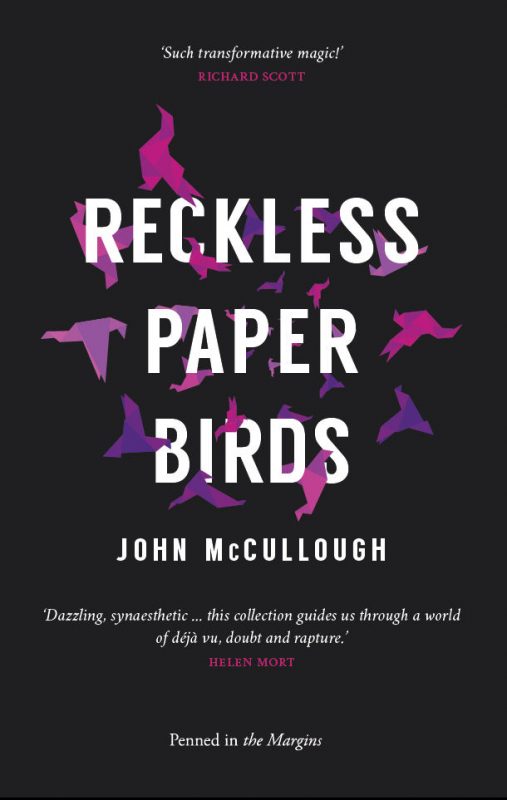REVIEW: JOHN MCCULLOUGH’S ‘RECKLESS PAPER BIRDS’
Reviewed by Stella Backhouse

Like swallows perched on a telegraph wire, the poems in John McCullough’s 2019 collection Reckless Paper Birds poems are delicately balanced. Located on the boundaries we believe run around and through us, McCullough’s poetry looks two ways at once, enabling him to probe how solid these lines really are. Even his queerness is not exempt as he imagines himself the proud and anxious father of a son who is unmistakeably his, but does “lots of things/with girls I never did”.
Skin is a common-sense dividing line between the body and the world outside, but here it is far from watertight: “a twenty year old body/a leaky skin suit I’d return to the shop/if I could”. And again “Without light, I’m all membrane; each part/becomes a gate. I pour across each margin/and nothing has enough hands to catch me”. Skin bears the imprint of the outside world, for good or ill: “I stare at my palm at the curve where yesterday/your lips nestled” but also “Under the peak of his cap, what was fragile/before the bruises, what would never fit”; elsewhere, through “a choreographer who had a wound fetish,/his painted skin a lavascape of open fractures and latex burns”, it acts as a window to the inner world.
Language too is traffic that crosses the filter between inner and outer, contributing to its imprecision. “I need my blurry edges” says the poet “a chance to figure out while speaking/what I’m trying to say”. Birds are used throughout the collection to symbolise the freedom of the unbound, but in ‘Flock of Paper Birds’, origami models made from refashioned pages of the Book of Leviticus (“Thou shalt not lie with mankind as with womankind: it is abomination” – Leviticus 18:22) are an intermediate species. While they take on lives of their own with words as their plumage, the poet returns to his lover’s body: “I guide my tongue along warm creases/and the tight sheet of his body unfolds.”
This circularity is evident elsewhere. Round and yellow as the sun, a new teapot promises “logic strict yet plump…offering a colour that might foster never-ending cups.” The words and rhythm of the book’s title, read out loud, reminded me of the zero-sum game of scissors, paper, stone. But circularity also implies that escape cannot be permanent: the head that breaks free and floats away into the night eventually resigns itself to reunion with its body and feeling “on my cheek/the clumsy brush of fingers…return to my sad attachment and try again/to understand the weight of being bodied”.
Other escape routes are double-edged. On a train journey, the poet endures homophobic ‘joking’ from a group of men on a stag night. Invisible to them, his inner sanctum and place of retreat is paralleled by the life outside the train: “a scattering of unseen beasts/voles and pheasants which thrive undercover”. For desperate queer men however, decreed non-existent by a Chechen regime that actually detains them in concentration camps, invisibility is not a blessing: “They accumulate/along ditches and railway tracks. Lately, I’ve started noticing them elsewhere”.
But throughout the collection, another fuzzy dividing line edges in. These are not miserable poems – many of them brim with sensual pleasure in sex, tea and the natural world, flash with references to the city of Brighton, Grindr and Lady Gaga and sparkle with a vibrant colour symbolism reminiscent of the Spanish modernist poet Federico García Lorca. But balancing all that is a place of monochrome; because in the midst of life, we are in death.
The poet’s first brush with mortality is treatment for gallstones: “I do not need another vessel to comprehend the dark./I am already a part of it”. He is further sobered by recognition that even the (for its size) loudest sound in the animal kingdom, the riotous penis-stridulation of the mighty male water boatman, will not defeat “that soloist who always wins”. But the concluding poem, ‘The Skeleton Flower’, is where his themes fuse most fully. Here, McCullough simultaneously witnesses the riotous partying of “lusty hands and kitchen discos” and his own dissolution into cascading water and the whiteness of bone. The transformation is complete. What was once hidden deep within has become the body’s only external.
Reckless Paper Birds is available for purchase online direct from publisher Penned in the Margins or from Waterstones, Hive and other reputable bookstores. This collection won the 2020 Hawthornden Prize and was shortlisted for the Costa 2019 Poetry Award.
